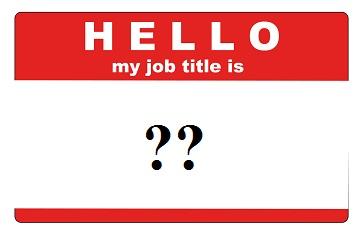 Many years ago when my brother Bill joined the company, he asked me what title he should have. The Oliver North scandal was the big news story of that day (long before General Petraeus), so I offered up “Lieutenant Colonel.” He was not amused.
Many years ago when my brother Bill joined the company, he asked me what title he should have. The Oliver North scandal was the big news story of that day (long before General Petraeus), so I offered up “Lieutenant Colonel.” He was not amused.
But here we are, more than 25 years later, and this issue of titles has been a big story in the radio community. Titles matter. They say a lot about one’s role in companies and organizations. To that end, we recently highlighted a Swedish ad agency, Honesty, that has banned the use of “digital titles.”
In response, consultant, author, speaker, and thought-leader Greg Verdino submitted a comment to that post that I believe was worthy of a larger stage. He has expanded on those thoughts, and they appear below as a guest post. A number of years ago, Greg worked for Arbitron, and has a keen insight into the radio business. Learn more about what he’s up to at www.gregverdino.com.
The first clickable web ad ran nearly 20 years ago – in 1993. The first modern social network launched 15 years ago (in 1997). The first blogging platform just one year later. Even Facebook and Twitter – relative babies on the block – have been with us for eight and six years respectively. Granted, eight years may not stack up to the 80+ year history of commercial radio, but on the flipside, something that has been around for eight years doesn’t exactly awe me with the shock of the new.
And just two weeks ago, Fred blogged about a seemingly bold move by Swedish ad agency Honesty to strike the word digital from its job titles, urging this blog’s readers to think about what their own job titles say about their stance toward web, social and mobile.
With a 20-year history of digital advertising in the rearview, anyone would be tempted to look at Honesty’s move (what differentiates a digital job from an analog job in a world that has been digital for decades?) or – for that matter – Saga’s shift from employing program directors to employing “brand managers,” and exclaim, “It’s about time!” What took them so long? What’s holding you back? And why should so many in the traditional media business still find this not-so-new-anymore thing called digital so troubling?
Well, let me assure you that, if you count yourself among the digitally confounded, you’re not alone. Don’t get me wrong. As an industry, radio lags behind its counterparts on the buy side of the business – but (Honesty aside, perhaps?) even advertisers lag the most important contingent of all: The consumers who have long since ceased to delineate between online and off, analog and digital, wired and mobile, and even local and global.
While I often consult for traditional and digital native media companies, I’ve also had the opportunity to work with a wide variety of agencies and dozens of big brand marketers directly. And here’s what I see right here in the States:
- Plenty of big agencies talk integration these days, but if you want something closer to the truth you need only look at how they operate, how their P&Ls are organized, and how their people work together (or not) to tackle client challenges. Integration doesn’t really mean that they take a consumer-centric, channel-agnostic approach – it means they have digital sister companies, a digital department, or an outside partner that they can bolt on if clients need something outside the agency’s core specialty.
- For most small agencies, integration is just a code word for mediocrity. A smart client knows that an “integrated” shop with a single office and seven employees is – at best – a jack of all trades, master of none. The smartest (and most successful) among the small agencies tend to stick to their knitting. And the smartest among the client-side marketers know that if they want the best-of-the-best, they don’t hire one small agency that claims to be traditional and digital, but instead retain two small agencies, each of which does just one of those things better than anyone else.
- What about the pure play digital agencies themselves? Shouldn’t they be more sophisticated? Shouldn’t they have already broken down the digital divide? Well, sure, everyone in their shop is “digital” so you need only call them account managers, media planners, creative directors, and strategists. But you can be rest assured that social and mobile are as foreign to a digital agency’s core team as digital may be to your GSM or traffic manager. Social media is handled by someone with social in her title; mobile by someone with mobile on his business card; even search by someone who does nothing but that one thing. This is as true at digital powerhouses like Digitas and Razorfish as it is at agencies the size of Honesty here in the states.
- Even client-side marketers tend to organize around media channel specializations, with dedicated digital, social and mobile teams working in support of a brand manager, marketing director or CMO. In fact, the most sophisticated client-side marketing organizations wouldn’t have gotten where they are today had they not initially invested in these capable specialists.
The fact that the clients you serve organize this way may not be particularly visionary or even ideal, but it’s also not accidental.
So what does this suggest? That radio groups can take their foot off the digital pedal? That digital departments are the way to go? Not exactly – or at least, not over the long haul. Philosophically, Walter Naeslund is spot-on. As provocation, his thinking (and actions) should force radio leaders to ponder the potential of adopting a digital ubiquity mindset. Practically though, if Honesty can in fact make a digital mindset – and more importantly, a digital skill set! – ubiquitous across its entire organization, it will have achieved a rare thing indeed.
 If I’m being honest about (ahem) Honesty, I’d suspect their digital transformation process began long before they dropped the word digital from their job descriptions. You need to be honest with yourself. As you’re pondering Fred’s posts about changing your titles, you must also consider how far down the path toward true across-the-company digital transformation you are today.
If I’m being honest about (ahem) Honesty, I’d suspect their digital transformation process began long before they dropped the word digital from their job descriptions. You need to be honest with yourself. As you’re pondering Fred’s posts about changing your titles, you must also consider how far down the path toward true across-the-company digital transformation you are today.
Changing your business cards is nothing when compared with changing your business culture. Organizations – much less the industries they operate in – don’t transform with little more than a poof of don’t-call-it-digital pixie dust.
Change begins at the very core of your business – and for each of us, at the very heart of our job. Where changing your titles won’t transform your business, shifting your mindset and growing your skill set will. The radio industry needs to be more progressive and aggressive in its pursuit of digital ubiquity, but that doesn’t mean groups should be chasing the provocative without first understanding the practical.
If that means appointing skilled specialists in dedicated roles, on the path toward setting new standards that will change your company culture (not to mention drive you to rethink your platforms, programming, products, and people), then you might want to save the new business cards for new hires with digital in their DNA.
As always, your comments are welcome. Thanks, Greg.
- Media And Technology In 2025: Believe It Or Not! - April 18, 2025
- In Radio, You Just Never Know - April 17, 2025
- The Secret To Making A Great Podcast (And Great Radio) - April 16, 2025




There seems to be a lack of an integration mindset all through the advertising world – not just agencies. Large media companies don’t really do it and each business unit is typically compensated on their own results – there is rarely any kind of incentive to work across media to solve client problems. Digital is only one place where radio stratifies its efforts…how about across clusters? When was the last time you heard a unified promotional theme on all of the stations in a cluster on behalf of a client?
CSS, the sales consultancy, now recommends clusters have a “Director of Results” position. This media agnostic person’s only goal is to maximize outcomes. I wonder if that kind of mindset – from inception to compensation is the real answer to who should do what for whom.
Thanks, Bob. Clearly, a focus on solutions and results ought to be at the core of the brand/client relationship. These are cataclysmic times, as Greg so skillfully points out. Everyone’s struggling to figure it out and make it work. Thanks again for adding to the conversation.